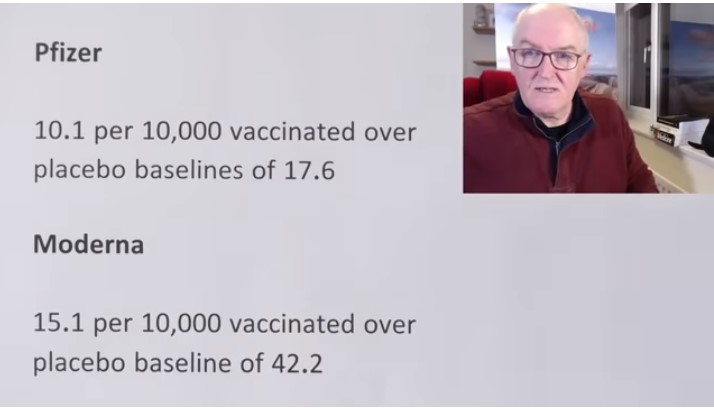COVID-19
Health researcher calls government promotion of Covid mRNA vaccines “confusing”

From (2079) Dr. John Campbell – YouTube
British Health researcher John Campbell has uncovered sobering and disturbing statistics regarding serious adverse events connected to covid vaccines.
As Campbell outlines in this presentation, multiple previous vaccines producing far fewer adverse events, have been withdrawn from public use while governments continue to promote covid vaccines.
(Campbell is well known for his meticulous research and he always includes links to the studies he is calling attention to. His presentation notes are below the video)
John Campbell’s research notes and links to relevant studies
Swine flu vaccine (1976), 1 serious event per 100,000 vaccinees,
Vaccine withdrawn Rotavirus vaccine
Rotashield, (1999),1 to 2 serious events per 10,000 vaccinees,
Vaccine withdrawn
Covid mRNA vaccines, 1 serious event per 800 vaccinees,
Vaccine officially promoted
Serious adverse events of special interest following mRNA COVID-19 vaccination in randomized trials in adults https://pubmed.ncbi.nlm.nih.gov/36055…
Free full text available https://www.ncbi.nlm.nih.gov/pmc/arti…
Why We Question the Safety Profile of mRNA COVID-19 Vaccines (Robert M Kaplan and Sander Greenland) https://sensiblemed.substack.com/p/wh…
Using publicly available data from Pfizer and Moderna studies, we found one serious adverse event for each 800 vaccinees. That translates to about 1,250 serious events for each million vaccine recipients.
US, Spain, Australia
Study to evaluate serious adverse events of special interest observed in mRNA COVID-19 vaccine trials.
Secondary analysis of serious adverse events reported in the placebo-controlled, phase III randomized clinical trials, of Pfizer and Moderna mRNA COVID-19 vaccines
Results Pfizer and Moderna mRNA COVID-19 vaccines were associated with an excess risk of serious adverse events
of special interest
Pfizer
10.1 per 10,000 vaccinated over placebo baselines of 17.6
Moderna
15.1 per 10,000 vaccinated over placebo baseline of 42.2
Combined, the mRNA vaccines Associated with an excess risk of serious adverse events of special interest of 12.5 per 10,000 vaccinated
Pfizer trial
Pfizer vaccine group 52 serious AESI (27.7 per 10,000) were reported
Pfizer placebo group 33 serious AESI (17.6 per 10,000) were reported
36 % higher risk of serious adverse events in the vaccine group
Risk difference 18.0 per 10,000 vaccinated
Moderna trial
Moderna trial, vaccine group 87 serious AESI (57.3 per 10,000) were reported
Moderna trial, placebo group 64 serious AESI (42.2 per 10,000) were reported
6 % higher risk of serious adverse events in the vaccine group
Risk difference 7.1 per 10,000 vaccinated
Discussion
The excess risk of serious adverse events found in our study points to the need for formal harm-benefit analyses, particularly those that are stratified according to risk of serious COVID-19 outcomes. These analyses will require public release of participant level datasets. Full transparency of the COVID-19 vaccine clinical trial data is needed, to properly evaluate these questions.
Unfortunately, as we approach 2 years after release of COVID-19 vaccines, participant level data remain inaccessible.
Level of adverse reactions in the past
The 1976 swine flu vaccine
Small increased risk of Guillain-Barré Syndrome
The increased risk was approximately 1 additional case of GBS for every 100,000 people who got the swine flu vaccine. When over 40 million people were vaccinated against swine flu, federal health officials decided that the possibility of an association of GBS with the vaccine, however small, necessitated stopping immunization until the issue could be explored.
The Institute of Medicine (2003) https://www.ncbi.nlm.nih.gov/books/NB…
Concluded that people who received the 1976 swine influenza vaccine had an increased risk for developing GBS. Exact reason for this association remains unknown.
Rotavirus vaccine Rotashield, (1999) https://www.cdc.gov/vaccines/vpd-vac/…
The U.S. Advisory Committee on Immunization Practices (ACIP) October 22, 1999 to no longer recommend use of the RotaShield® vaccine for infants, because of an association between the vaccine and intussusception. The results of the investigations showed that RotaShield® vaccine caused intussusception in some healthy infants Within 2 weeks Intussusception increased 20 to 30 times over the expected risk (Less after the second and third dose) CDC estimated that one or two additional cases of intussusception would be caused among each 10,000 infants vaccinated with RotaShield® vaccine.
COVID-19
Trump DOJ seeks to quash Pfizer whistleblower’s lawsuit over COVID shots

From LifeSiteNews
The Justice Department attorney did not mention the Trump FDA’s recent admission linking the COVID shots to at least 10 child deaths so far.
The Trump Department of Justice (DOJ) is attempting to dismiss a whistleblower case against Pfizer over its COVID-19 shots, even as the Trump Food & Drug Administration (FDA) is beginning to admit their culpability in children’ s deaths.
As previously covered by LifeSiteNews, in 2021 the BMJ published a report on insider information from a former regional director of the medical research company Ventavia, which Pfizer hired in 2020 to conduct research for the company’s mRNA-based COVID-19 shot.
The regional director, Brook Jackson, sent BMJ “dozens of internal company documents, photos, audio recordings, and emails,” which “revealed a host of poor clinical trial research practices occurring at Ventavia that could impact data integrity and patient safety […] We also discovered that, despite receiving a direct complaint about these problems over a year ago, the FDA did not inspect Ventavia’s trial sites.”
According to the report, Ventavia “falsified data, unblinded patients, employed inadequately trained vaccinators, and was slow to follow up on adverse events reported in Pfizer’s pivotal phase III trial.” Overwhelmed by numerous problems with the trial data, Jackson filed an official complaint with the FDA.
Jackson was fired the same day, and Ventavia later claimed that Jackson did not work on the Pfizer COVID-19 shot trial; but Jackson produced documents proving she had been invited to the Pfizer trial team and given access codes to software relating to the trial. Jackson filed a lawsuit against Pfizer for violating the federal False Claims Act and other regulations in January 2021, which was sealed until February 2022. That case has been ongoing ever since.
Last August, U.S. District Judge Michael Truncale dismissed most of Jackson’s claims with prejudice, meaning they could not be refiled. Jackson challenged the decision, but the Trump DOJ has argued in court to uphold it, Just the News reports, with DOJ attorney Nicole Smith arguing that the case concerns preserving the government’s unfettered power to dismiss whistleblower cases.
The rationale echoes a recurring trend in DOJ strategy that Politico described in May as “preserving executive power and preventing courts from second-guessing agency decisions,” even in cases that involve “backing policies favored by Democrats.”
Jackson’s attorney Warner Mendenhall responded that the administration “really sort of made our case for us” in effectively admitting that DOJ is taking the Fair Claims Act’s “good cause” standard for state intervention to mean “mere desire to dismiss,” which infringes on his client’s “First Amendment right to access the courts, to vindicate what she learned.”
Mendenhall added that in a refiled case, Jackson “may be able to bring a very different case along the same lines, but with the additional information” to prove fraud, whereas rejection would send the message that “if fraud involves government complicity, don’t bother reporting it.”
That additional information would presumably include the FDA’s recent admission that at least 10 children the agency has reviewed so far “died after and because of receiving COVID-19 vaccination.”
“The truth is we do not know if we saved lives on balance,” admitted FDA Chief Medical Officer Vinay Prasad in a recent leaked email. “It is horrifying to consider that the U.S. vaccine regulation, including our actions, may have harmed more children than we saved. This requires humility and introspection.”
The COVID shots have been highly controversial ever since the first Trump administration’s Operation Warp Speed initiative prepared and released them in a fraction of the time any previous vaccine had ever been developed and tested. As LifeSiteNews has extensively covered, a large body of evidence has steadily accumulated over the past five years indicating that the COVID jabs failed to prevent transmission and, more importantly, carried severe risks of their own.
Ever since, many have intently watched and hotly debated what President Donald Trump would do about the situation upon his return to office. Though he never backed mandates like former President Joe Biden did, for years Trump refused to disavow the shots to the chagrin of his base, seeing Operation Warp Speed as one of his crowning achievements. At the same time, during his latest run he embraced the “Make America Healthy Again” movement and its suspicion of the medical establishment more broadly.
So far, Trump’s second administration has rolled back several recommendations for the shots but not yet pulled them from the market, despite hiring several vocal critics of the COVID establishment and putting the Department of Health & Human Services under the leadership of America’s most prominent anti-vaccine advocate, Robert F. Kennedy Jr. Most recently, the administration has settled on leaving the current jabs optional but not supporting work to develop successors.
In a July interview, FDA Commissioner Marty Makary asked for patience from those unsatisfied by the administration’s handling of the shots, insisting more time was needed for comprehensive trials to get more definitive data.
COVID-19
Canadian Health Department funds study to determine effects of COVID lockdowns on children

From LifeSiteNews
The commissioned study will assess the impact on kids’ mental well-being of COVID lockdowns and ‘remote’ school classes that banned outdoor play and in-person learning.
Canada’s Department of Health has commissioned research to study the impact of outdoor play on kids’ mental well-being in light of COVID lockdowns and “remote” school classes that, for a time, banned outdoor play and in-person learning throughout most of the nation.
In a notice to consultants titled “Systematic Literature Reviews And Meta Analyses Supporting Two Projects On Children’s Health And Covid-19,” the Department of Health admitted that “Exposure to green space has been consistently associated with protective effects on children’s physical and mental health.”
A final report, which is due in 2026, will provide “Health Canada with a comprehensive assessment of current evidence, identify key knowledge gaps and inform surveillance and policy planning for future pandemics and other public health emergencies.”
Bruce Squires, president of McMaster Children’s Hospital of Hamilton, Ontario, noted in 2022 that “Canada’s children and youth have borne the brunt” of COVID lockdowns.
From about March 2020 to mid-2022, most of Canada was under various COVID-19 mandates and lockdowns, including mask mandates, at the local, provincial, and federal levels. Schools were shut down, parks were closed, and most kids’ sports were cancelled.
Mandatory facemask polices were common in Canada and all over the world for years during the COVID crisis despite over 170 studies showing they were not effective in stopping the spread of COVID and were, in fact, harmful, especially to children.
In October 2021, then-Prime Minister Justin Trudeau announced unprecedented COVID-19 jab mandates for all federal workers and those in the transportation sector, saying the un-jabbed would no longer be able to travel by air, boat, or train, both domestically and internationally.
As reported by LifeSiteNews, a new report released by the Justice Centre for Constitutional Freedoms (JCCF) raised alarm bells over the “harms caused” by COVID-19 lockdowns and injections imposed by various levels of government as well as a rise in unexplained deaths and bloated COVID-19 death statistics.
Indeed, a recent study showed that COVID masking policies left children less able to differentiate people’s emotions behind facial expressions.
COVID vaccine mandates and lockdowns, which came from provincial governments with the support of the federal government, split Canadian society.
-

 National1 day ago
National1 day agoCanada’s free speech record is cracking under pressure
-

 Digital ID23 hours ago
Digital ID23 hours agoCanada considers creating national ID system using digital passports for domestic use
-

 Business1 day ago
Business1 day agoAlbertans give most on average but Canadian generosity hits lowest point in 20 years
-

 Fraser Institute22 hours ago
Fraser Institute22 hours agoClaims about ‘unmarked graves’ don’t withstand scrutiny
-

 Crime2 days ago
Crime2 days agoU.S. seizes Cuba-bound ship with illicit Iranian oil history
-

 Daily Caller2 days ago
Daily Caller2 days agoUS Supreme Court Has Chance To End Climate Lawfare
-

 Business1 day ago
Business1 day agoTaxpayers Federation calls on politicians to reject funding for new Ottawa Senators arena
-

 International2 days ago
International2 days agoMarjorie Taylor Greene’s ’60 Minutes’ interview reveals power struggle between populists and RINOs









